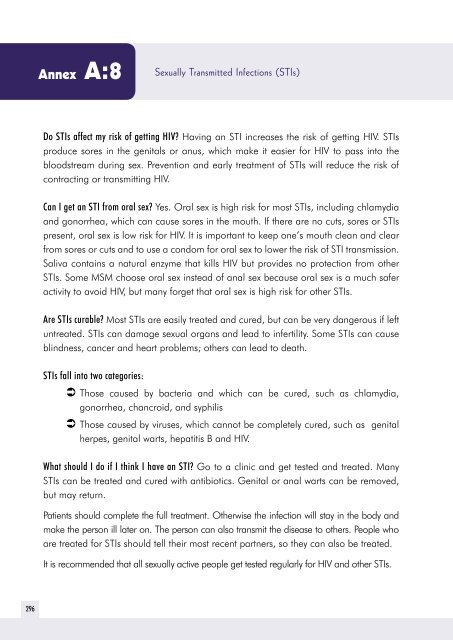- Page 1 and 2:
Understanding and Challenging Stigm
- Page 3 and 4:
Acknowledgments The toolkit was dev
- Page 5 and 6:
Table of Contents Acronyms ........
- Page 7:
Contents D2. HIV Transmission and M
- Page 10 and 11:
Why a Toolkit on Stigma toward Men
- Page 12 and 13:
What is the Toolkit? What is the To
- Page 14 and 15:
How to Use the Toolkit The toolkit
- Page 16 and 17:
Sample Programs for Different Types
- Page 18 and 19:
The Exercises or Session Plans Each
- Page 20 and 21:
Tips for Facilitating Participatory
- Page 22 and 23:
Tips for Facilitating Participatory
- Page 24 and 25:
Tips for Facilitating Participatory
- Page 26 and 27:
Tips for Facilitating Participatory
- Page 28 and 29:
Tips for Facilitating Participatory
- Page 30 and 31:
Tips for Facilitating Participatory
- Page 32 and 33:
Tips for Facilitating Participatory
- Page 34 and 35:
Chapter A: Naming Stigma and Discri
- Page 36 and 37:
A1 Naming Stigma and Discrimination
- Page 38 and 39:
A1 Naming Stigma and Discrimination
- Page 40 and 41:
A1 Naming Stigma and Discrimination
- Page 42 and 43:
A1 Naming Stigma and Discrimination
- Page 44 and 45:
A2 What the Community Says, Fears,
- Page 46 and 47:
A2 What the Community Says, Fears,
- Page 48 and 49:
A2 What the Community Says, Fears,
- Page 50 and 51:
A3 Naming Stigma and Discrimination
- Page 52 and 53:
A3 Naming Stigma and Discrimination
- Page 54 and 55:
A3 Naming Stigma and Discrimination
- Page 56 and 57:
A4 Naming Stigma and Discrimination
- Page 58 and 59:
A4 Naming Stigma and Discrimination
- Page 60 and 61:
A4 Naming Stigma and Discrimination
- Page 62 and 63:
A4 Naming Stigma and Discrimination
- Page 64 and 65:
A5 Finding Solutions to Challenge S
- Page 66 and 67:
A5 Finding Solutions to Challenge S
- Page 68 and 69:
A5 Finding Solutions to Challenge S
- Page 70 and 71:
A6 Naming Stigma and Discrimination
- Page 72 and 73:
A6 Naming Stigma and Discrimination
- Page 74 and 75:
A6 Naming Stigma and Discrimination
- Page 76 and 77:
A7 Personal Experience of Being Sti
- Page 78 and 79:
A7 Personal Experience of Being Sti
- Page 80 and 81:
A7 Personal Experience of Being Sti
- Page 82 and 83:
A7 Personal Experience of Being Sti
- Page 84 and 85:
A8 What Is the Meaning of Stigma? F
- Page 86 and 87:
A8 What Is the Meaning of Stigma? S
- Page 88 and 89:
A9 The Blame Game Facilitator’s N
- Page 90 and 91:
A9 The Blame Game 2. Things the com
- Page 92 and 93:
A9 The Blame Game 3. Report back: B
- Page 94 and 95:
A9 The Blame Game So how should we
- Page 96 and 97:
A10 When the Family Discovers that
- Page 98 and 99:
A10 When the Family Discovers that
- Page 100 and 101:
A10 When the Family Discovers that
- Page 102 and 103:
A10 When the Family Discovers that
- Page 104 and 105:
A10 When the Family Discovers that
- Page 106 and 107:
A11 Forms, Effects, and Causes of S
- Page 108 and 109:
A11 Forms, Effects, and Causes of S
- Page 110 and 111:
A12 How Stigma toward Men who Have
- Page 112 and 113:
A12 How Stigma toward Men who Have
- Page 114 and 115:
A13 Stigma and Discrimination towar
- Page 116 and 117:
A13 Stigma and Discrimination towar
- Page 118 and 119:
A13 Stigma and Discrimination towar
- Page 120 and 121:
A13 Stigma and Discrimination towar
- Page 122 and 123:
A13 Stigma and Discrimination towar
- Page 124 and 125:
Chapter B: Understanding What it Me
- Page 126 and 127:
B1 Breaking the Sex Taboo Facilitat
- Page 128 and 129:
B1 Breaking the Sex Taboo Example R
- Page 130 and 131:
B1 Breaking the Sex Taboo Example Q
- Page 132 and 133:
B1 Breaking the Sex Taboo Example R
- Page 134 and 135:
B2 What Do We Know about Men who Ha
- Page 136 and 137:
B2 What Do We Know about Men who Ha
- Page 138 and 139:
B2 What Do We Know about Men who Ha
- Page 140 and 141:
B3 What is Sex? What is Gender? Fac
- Page 142 and 143:
B3 What is Sex? What is Gender? Exa
- Page 144 and 145:
B4 Act Like a Real Man Facilitator
- Page 146 and 147:
B4 Act Like a Real Man Review the p
- Page 148 and 149:
B4 Act Like a Real Man Example Resp
- Page 150 and 151:
B5 Sex, Gender Identity, Gender Exp
- Page 152 and 153:
B5 Sex, Gender Identity, Gender Exp
- Page 154 and 155:
B5 Sex, Gender Identity, Gender Exp
- Page 156 and 157:
B5 Sex, Gender Identity, Gender Exp
- Page 158 and 159:
B5 Sex, Gender Identity, Gender Exp
- Page 160 and 161:
B5 Sex, Gender Identity, Gender Exp
- Page 162 and 163:
B6 Misconceptions about Men who Hav
- Page 164 and 165:
B6 Misconceptions about Men who Hav
- Page 166 and 167:
B6 Misconceptions about Men who Hav
- Page 168 and 169:
B7 Value Clarification Facilitator
- Page 170 and 171:
B7 Value Clarification Step: 1. Rap
- Page 172 and 173:
B7 Value Clarification Example of a
- Page 174 and 175:
Annex for Chapter B: What Do You Kn
- Page 176 and 177:
Annex for Chapter B: What Do You Kn
- Page 178 and 179:
Annex for Chapter B: What Do You Kn
- Page 180 and 181:
Annex for Chapter B: What Do You Kn
- Page 182 and 183:
Chapter C: Coping with Stigma and D
- Page 184 and 185:
C1 Personal Experiences of Stigma F
- Page 186 and 187:
C1 Personal Experiences of Stigma 3
- Page 188 and 189:
C1 Personal Experiences of Stigma E
- Page 190 and 191:
C2 Strategies for Coping with Stigm
- Page 192 and 193:
C2 Strategies for Coping with Stigm
- Page 194 and 195:
C3 How to Challenge Stigma in an As
- Page 196 and 197:
C3 How to Challenge Stigma in an As
- Page 198 and 199:
C3 How to Challenge Stigma in an As
- Page 200 and 201:
C4 Disclosure: How to Disclose to t
- Page 202 and 203:
C4 Disclosure: How to Disclose to t
- Page 204 and 205:
C4 Disclosure: How to Disclose to t
- Page 206 and 207:
C4 Disclosure: How to Disclose to t
- Page 208 and 209:
C5 Coping with Stress Facilitator
- Page 210 and 211:
C5 Coping with Stress 2. Discussion
- Page 212 and 213:
C6 Relations between Men who Have S
- Page 214 and 215:
C6 Relations between Men who Have S
- Page 216 and 217:
Chapter D: Men who Have Sex with Me
- Page 218 and 219:
D1 Assessing Knowledge about HIV an
- Page 220 and 221:
D1 Assessing Knowledge about HIV an
- Page 222 and 223:
D2 HIV Transmission and Men who Hav
- Page 224 and 225:
D2 HIV Transmission and Men who Hav
- Page 226 and 227:
D2 HIV Transmission and Men who Hav
- Page 228 and 229:
D2 HIV Transmission and Men who Hav
- Page 230 and 231:
D2 HIV Transmission and Men who Hav
- Page 232 and 233:
D3 HIV Risk Factors in Same Sex Rel
- Page 234 and 235:
D3 HIV Transmission and Men who Hav
- Page 236 and 237:
D3 HIV Risk Factors in Same Sex Rel
- Page 238 and 239:
Chapter E: Moving to Action Introdu
- Page 240 and 241:
Chapter E: Moving to Action Key Mes
- Page 242 and 243:
Chapter E: Moving to Action Things
- Page 244 and 245:
E1 Start with a Vision - A World wi
- Page 246 and 247:
E1 Start with a Vision - A World wi
- Page 248 and 249:
E1 Start with a Vision - A World wi
- Page 250 and 251:
E2 Men who Have Sex with Men and Hu
- Page 252 and 253:
E2 Men who Have Sex with Men and Hu
- Page 254 and 255: E2 Men who Have Sex with Men and Hu
- Page 256 and 257: E2 Men who Have Sex with Men and Hu
- Page 258 and 259: E3 Challenge What People Say about
- Page 260 and 261: E3 Challenge What People Say about
- Page 262 and 263: E3 Challenge What People Say about
- Page 264 and 265: E4 Action - Writing a Code of Condu
- Page 266 and 267: E4 Action - Writing a Code of Condu
- Page 268 and 269: E4 Action - Writing a Code of Condu
- Page 270 and 271: E4 Action - Writing a Code of Condu
- Page 272 and 273: E4 Action - Writing a Code of Condu
- Page 274 and 275: Annex A: Information Sheets 1. Glos
- Page 276 and 277: Annex A:1 Glossary of Terms Bisexua
- Page 278 and 279: Annex A:1 Glossary of Terms LGBTI i
- Page 280 and 281: Annex A:2 Men who Have Sex with Men
- Page 282 and 283: Annex A:2 Men who Have Sex with Men
- Page 284 and 285: Annex A:2 Men who Have Sex with Men
- Page 286 and 287: Annex A:2 Men who Have Sex with Men
- Page 288 and 289: Annex A:3 Becoming Open: Stages in
- Page 290 and 291: Annex A:4 What Do I Do If Someone W
- Page 292 and 293: Annex A:5 Stigma and Discrimination
- Page 294 and 295: Annex A:5 Stigma and Discrimination
- Page 296 and 297: Annex A:6 Human Rights What are hum
- Page 298 and 299: Annex A:6 Human Rights Right to be
- Page 300 and 301: Annex A:7 Hate Violence There have
- Page 302 and 303: Annex A:8 Sexually Transmitted Infe
- Page 306 and 307: Annex A:9 HIV Transmission The HIV
- Page 308 and 309: Annex A:9 HIV Transmission During a
- Page 310 and 311: Annex A:10 HIV and AIDS: Frequently
- Page 312 and 313: Annex A:11 Code of Conduct for Heal
- Page 314 and 315: Annex A:12 Code of Conduct for the
- Page 316 and 317: Annex B: Stigma Pictures M1 Father
- Page 318 and 319: M.1 Annex B
- Page 320 and 321: M.3 Annex B
- Page 322 and 323: M.5 Annex B
- Page 324 and 325: M.7 Annex B
- Page 326 and 327: M.9 Annex B
- Page 328 and 329: M.11 Annex B
- Page 330 and 331: M.13 Annex B
- Page 332 and 333: M.15 Annex B
- Page 334: M.17 Annex B
















